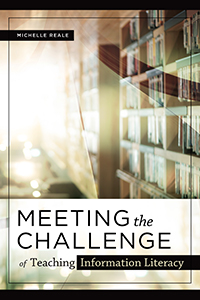Primary tabs
You don't need to be an ALA Member to purchase from the ALA Store, but you'll be asked to create an online account/profile during checkout to proceed. This Web Account is for both Members and non-Members. Note that your ALA Member discount will be applied at the final step of the checkout process.
If you are Tax-Exempt, please verify that your account is currently set up as exempt before placing your order, as our new fulfillment center will need current documentation. Learn how to verify here.
- Description
- Table of Contents
- About the author
- Reviews
While the profession has generated many books on information literacy, none to date have validated exactly why it is so difficult to teach. In her new book, Reale posits that examining and reflecting on the reality of those factors is what will enable practitioners to meet the challenge of their important mandate. Using the same warm and conversational tone as in her previous works, she
- uses personal anecdotes to lay out the key reasons that teaching information literacy is so challenging, from the limited amount of time given to instructors and lack of collaboration with faculty to one’s own anxieties about the work;
- examines how these factors are related and where librarians fit in;
- validates readers’ struggles and frustrations through an honest discussion of the emotional labor of librarianship, including “imposter syndrome,” stress, and burnout;
- offers a variety of approaches, strategies, and topics of focus that will assist readers in their daily practice;
- looks at how a vibrant community of practice can foster positive change both personally and institutionally; and
- presents “Points to Ponder” at the end of each chapter that encourage readers to self-reflect and then transform personal insights into action.
Reale’s book is a valuable springboard for reflection that will help academic librarians understand the complexity of the challenges they face and then forge a path forward.
Introduction
Chapter 1 It Don’t Come Easy
Chapter 2 The Idea of a Concept or the Concept of an Idea
Information Literacy
Chapter 3 Information Literacy
Still the “Hidden Concept”?
Chapter 4 You Just Don’t Get It
The Harm of Persistent Librarian Stereotypes
Chapter 5 Inching toward the Mirror
Self-Perception, Imposter Syndrome, and Anxiety
Chapter 6 More Than Just Transactional
Faculty, Librarians, Service, and Collaboration
Chapter 7 That Anxious Feeling
Library Anxiety as a Hindrance to Learning
Chapter 8 Exhausted
The Emotional Labor of Librarianship
Chapter 9 Can’t We All Just Get Along?
Faculty Relationships and Collaboration
Chapter 10 Let’s Give Them Something to Talk About
Communities of Practice in the Library
Conclusion
Index
Michelle Reale
Michelle Reale is a professor and access services and outreach librarian at Arcadia University. Her books include Inquiry and Research: A Relational Approach in the Classroom, The Indispensable Academic Librarian: Teaching and Collaborating for Change, Mentoring and Managing Students in the Academic Library, Becoming an Embedded Librarian, and Becoming a Reflective Librarian and Teacher: Strategies for Mindful Academic Practice. Her research interests are embedded librarianship, mentoring, narrative inquiry, poetic inquiry, and reflective practice.
"Reale has provided a book that can easily be used in a variety of ways: a guideline for a new librarian to delve into self-assessment, a conversation starter with an instruction team on how to tackle the nuances of being a librarian who teaches (a one-shot or lengthier class), or a roadmap for implementing a professional learning community. No matter how the reader opts to use this text, it will provide food for fodder ... Her transparency is welcoming to librarians who may be feeling burned out or those who are just starting out in the profession. Adding it to a professional development collection would provide guidance for many.”
— Public Services Quarterly
"A candid overview of the internal and external barriers to success that academic librarians face teaching information literacy (IL). This work emphasizes the need for librarians to find solutions in collaboration with other librarians and faculty ... Reale’s vulnerable writing style and insightfulness make this a great read, especially for librarians who have felt isolated from coworkers, faculty, and students after the COVID-19 pandemic. As institutions are reestablishing a new normal, there is no better time than now to learn from Reale’s experience in forming collaborations to address IL challenges."
— Serials Review



